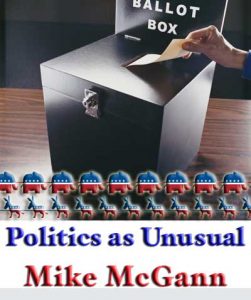By Mike McGann, Editor, The Times
 Until Saturday, the early state voters in the Democratic primary had spoken: “Four More Years of Trump!”
Until Saturday, the early state voters in the Democratic primary had spoken: “Four More Years of Trump!”
While Joe Biden’s strong win in South Carolina gave hope to his campaign, the fact remains that he is underfunded and a strong underdog on Super Tuesday. At this point, there are no other viable candidates to take on Sen. Bernie Sanders.
This fact — barring radical changes to the election landscape — remains:
Sanders will win the Democratic nomination and lose the general election to Trump.
How do we know this? Simple. Sanders will lose here in Chester County.
In fact, alone among Democratic contenders, Sanders is probably the only candidate who will lose in Chester County, which Hillary Clinton won by 9.5 points in 2016.. Joe Biden would win by double digits. Pete Buttigieg, Amy Klobuchar and Mike Bloomberg would win by high single digits and Elizabeth Warren would probably win a close race.
Mirror those results to Montgomery and Bucks, along with smaller margins of victory in Delaware County and Philadelphia and the conclusion is this: Sanders will lose Pennsylvania, all but ensuring a Trump victory. Yes, I know polls show him with a narrow lead over Trump, but many of those same polls showed Hillary Clinton with a solid lead over Trump in 2016.
Sometimes, experience and your gut tell you more about a race than poll numbers.
Why? Consider all of the suburban Republicans and moderate independents who were willing to vote for Hillary Clinton in 2016 and for Democrats in subsequent elections. How many will vote for Sanders, who describes himself as a Socialist? Frankly, while some will still vote for him, for many, it will be a bridge too far to cross and they’ll either stay home or cast a very reluctant vote for Trump. Yes, there will be a higher youth vote for Sanders, but that is a segment of voter that tends to have much lower turn out rates than the older, more moderate voters who will be uncomfortable with Sanders. So far, Sanders hasn’t been able to really spike turnout in the under-30 demographic.
And to be clear, if Trump wins Pennsylvania, it’s game over for the Democrats.
The entire race comes down to six swing states: Arizona, Florida, Michigan, North Carolina, Pennsylvania and Wisconsin.
Without those six states, a Democrat would hold a 232 to 205 lead over Trump in the other 44 states.
Already, Wisconsin seems like a lost cause for anyone beyond maybe Biden. So add 10 electoral votes for Trump. And Arizona seems like a heavy lift for any Democrat and probably an impossible one for Sanders. 11 more electoral votes. With those two states, now it is a 232-226 race.
Let’s give Michigan to Sanders — I think Democrats wildly underperformed there in 2016 due to campaign malpractice — making it 248-226. North Carolina? While I think a number of Democrats could win there, Sanders is not one of them. Make it 248-241.
Then there’s Florida and Pennsylvania.
Sanders’ comments about Cuba and his spat with The American Israel Public Affairs Committee probably doom him in Florida (understand if any Democrat wins Florida, it will be by a razor thin margin, so even small issues can make the difference and these aren’t small issues).
And if he can’t win Chester County (or Bucks or Montgomery), he can’t win Pennsylvania.
And that’s game over, folks.
If Democrats can’t find a single moderate candidate to get behind, Sanders will win the nomination and lose the general. No, it won’t be the McGovern-like blow out of 1972, but a likely 290-248 loss in the electoral college.
At minimum, the race needs to narrow to Biden, Sanders and Warren. Klobuchar, Buttigieg and Bloomberg need to get out. Tulsi Gabbard needs to admit she’s running as an independent, even if she is irrelevant at this point.
Of course, it won’t happen — as a billionaire Bloomberg have a divine right of kings attitude about his race and won’t run out of money (I was a bit surprised Steyer quit Saturday — a good decision), while Buttigieg and Klobuchar will stubbornly hang on, handing the race to Sanders.
Which means four more years of Trump — and likely a few less local state legislators and zero chance for Democrats to take control of the General Assembly.
***
We don’t know the full impact from the Coronavirus at this point, but it seems likely there will be both economic and political impacts — and obviously, impacts on day to day life for many people.
Can it be contained? It’s tough to say, but increasingly it is looking difficult to expect.
We’ll get to the political impact, shortly, but let’s look at the near-term and long-term economic impacts.
Obviously, seeing the fall this week in the Dow Jones and other stock indexes, the business community is concerned. Even if the virus doesn’t become a widespread issue in North America, it is evident that supply-chain issues will be significant when it comes to China and the rest of Asia. Shortages of varying types of product will become serious, slowing the economy during the second quarter.
If the virus takes hold, we’ll see hits in retail shopping, entertainment venues, vacation travel and business in general as people self-quarantine. With the economy already slowing — and sliding toward recession in other parts of the world — the virus outbreak could well shove the economy into recession during the second half of 2020.
The political impacts are many.
If the economy tanks, it severely hurts Trump — as many of his supporters have hung in with the various issues in his administration because of the economy. Ask Jimmy Carter or George H.W. Bush how it works when the economy tanks during an election year.
Trump’s suggestion that a “miracle” will stop the virus, rather than vigorous government response probably won’t play well if this goes sideways.
Additionally, it changes the Democratic primary. Fear could lead some to move their support to Biden, who while unexciting, is a seasoned, trusted leader who would be seen able to capably lead the nation in time of crisis. Virtually none of the other Democratic candidates have Biden’s experience in government and the essential trust of a majority of the people (especially on the Democratic side).
Between the Coronavirus and the growing hot war between Turkey and Russian forces in Syria, Biden’s calm, steady hand might seem like a safe haven after the chaos of Trump.
***
Disappointed to hear that Anton Andrew — the Democrats’ strongest candidate for the 160th District State House is in court, literally fighting for his political life. His nominating petitions have been challenged — over his listing his occupation as Attorney/Educator. Andrew alleges that the challenge comes from Cathy Spahr, his Delaware County-based opponent (and yes related to the Ballard-Spahr legal powerhouse).
Two things, despite using high-priced campaign consultants, this was an unforced error. Nominating petitions have one rule: keep it simple, stupid. Attorney is easily defended, as Andrew worked much of his career as one. Educator? Not as easy — he did serve as an advisor to the President of Cheyney University, but that seems to be the extent of his work in education.
Why risk a challenge here? Even if the candidate thinks something is a good idea, the campaign consultants (who tend to eat a very large amount of those $25 donations you send in) should have interceded.
Another concern: Andrew got just 450 signatures — he needs 300. That’s a very small margin of error. Yes, collecting and managing a petition drive is tough, but it is a necessary part of the process. As I recall, I got more than 700 in a vastly less Democratic district in 2004 — in part because I knew I might be challenged if the number was close and in part because I knew virtually every signature turns into a November vote.
Any campaign consultant worth their salt would have made those points abundantly clear.
Both parties have to start asking questions about fat cat political consultants who suck up a lot of money and give awful advice.






